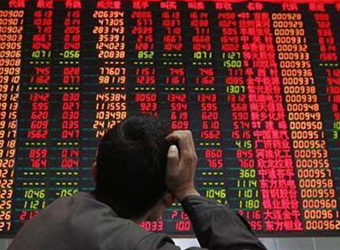Asian markets traded in negative territory early on Wednesday after Wall Street reversed a triple-digit point gain to close lower in the previous session.
Japan’s Nikkei 225 declined 0.45 percent after touching a 26-year high in the last session. Major exporter stocks traded mixed while index heavyweights SoftBank Group and Fanuc declined 1.14 percent and 3.14 percent, respectively.
Core machinery orders released Wednesday showed a second consecutive monthly increase for the month of November, Reuters said. Core orders, a volatile metric, rose 5.7 percent compared to the previous month — easily topping the 1.4 percent decline projected in a Reuters poll.
Over in South Korea, the Kospi slipped 0.44 percent. Shares of Samsung Electronics declined 0.57 percent. Rival chipmaker SK Hynix edged down 0.67 percent after trading above the flat line earlier in the day.
In Australia, the S&P/ASX 200 lost 0.54 percent following the fall in base metals seen overnight. The materials sector led losses on the index, trading lower by 2.03 percent. Major mining names recorded significant declines: Rio Tinto fell 3.46 percent, BHP tumbled 2.91 percent and Fortescue Metals slid 3.01 percent. Hong Kong’s Hang Seng Index pulled back 0.38 percent after notching a record close on Tuesday.
Hong Kong’s Hang Seng Index pulled back 0.38 percent after notching a record close on Tuesday.
Financials were a mixed picture after rising in the last session: HSBC Holdings and China Construction Bank gave up early gains gains to trade flat in the afternoon, while insurer AIA declined 0.37 percent.
Shares of Wanda Hotel Development jumped 4.51 percent after it announced in a Tuesday filing that it would gain 434 million Hong Kong dollars ($55 million) after selling its stake in Wanda International Real Estate Investment to an unnamed third party.
The Wanda International stake will be sold for just under 36 million pounds ($49 million).
Technology names were also broadly lower, although index heavyweight Tencent traded 0.14 percent higher.
On the mainland, the Shanghai composite bucked the overall downward trend to eke out slight gains, climbing 0.14 percent. The Shenzhen composite, however, slid 0.38 percent. The blue chip CSI 300 index slipped 0.26 percent.
Stateside, stock indexes closed in negative territory despite trading at record highs earlier in the session. The Dow Jones industrial average cracked the 26,000 barrier on Tuesday, but later reversed gains to finish the session lower by 0.04 percent, or 10.33 points, at 25,792.86.
Those declines came despite expectation-topping earnings reports as markets focused on the chances of a government shutdown stateside in the scenario Congress fails to pass a spending bill by Friday.
Bitcoin pared some losses after tumbling below the $10,000 mark on U.S. cryptocurrency marketplace Coinbase. The broad sell-off in digital currencies saw bitcoin tumble more than 28 percent at one point. At 1:17 p.m. HK/SIN, bitcoin traded at $10,917.81, according to industry site CoinDesk.
Ethereum, the second largest cryptocurrency by market cap, traded at $975.32 after falling around 30 percent earlier.
Other cryptocurrencies fared even worse.
The declines followed comments from South Korean authorities that indicated tougher regulation on digital currency trading was being considered. That said, there was no immediately apparent driver behind the most recent decline.
Shares of Asian companies exposed to bitcoin also saw declines on the day. In Japan, Remixpoint declined 4.467 percent, Ceres sank 14 percent and GMO Internet fell 8.47 percent. South Korean bitcoin-associated plays also plunged: Vidente lost 18.53 percent and Kakao tumbled 4.98 percent.
In currency markets, the dollar edged up after pausing for breath in the last session. The dollar index, which tracks the greenback against a basket of six currencies, traded at 90.597 at 1:13 p.m. HK/SIN, off a session low of 90.341.
Against the yen, the dollar rose to fetch 110.84.
Meanwhile, the euro was mostly steady after pulling back from three-year highs in the last session. The common currency traded at $1.2250 after falling as low as $1.2193 on Tuesday.
Those overnight declines had followed news the European Central Bank might not adjust its policy stance at its January meeting. Doubts surrounding coalition talks in Germany also weighed on the common currency in the last session.
On the energy front, oil prices reversed earlier gains to retreat further from their highest levels in three years overnight. U.S. crude futures lost 0.19 percent to trade at $63.61 per barrel. Brent crude futures edged down 0.16 percent to trade at $69.04.
Source: CNBC
